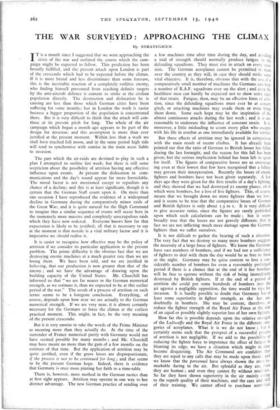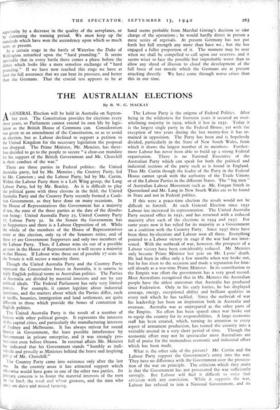THE WAR SURVEYED : APPROACHING THE CLIMAX
By STRATEGICUS
T T is a month since I suggested that we were approaching the 1 crisis of the war and outlined the course which the cam- paign might be expected to follow. This prediction has been broadly fulfilled, and the present attack upon London is part of the crescendo which had to be expected before the climax. If it is more brutal and less discriminate than some foresaw, this is the inevitable reaction of a completely ruthless enemy, who finding himself prevented from reaching definite targets by the anti-aircraft defence is content to strike at the civilian population directly. The destruction and dislocation he is causing are less than those which German cities have been suffering for some months; but in London the work is easier because a bigger proportion of the population is concentrated there. But it is very difficult to think that the attack will con- tinue at its present pitch for long. The whole of the air campaign which began a month ago appears to be part of the design for invasion; and this assumption is more than ever justified at the present moment. Within less than a week we shall have reached full moon, and in the same period high tide will tend to synchronise with sunrise in the main areas liable to invasion.
The part which the air-raids are destined to play in such a plan I attempted to outline last week; but there is still some scepticism about the possibility of attrition having any effective influence upon events. At present the dislocation in com- munications and the day's round appear far more formidable. The moral factor is not mentioned except to repudiate any chance of a decline; and this is at least significant, though it is certain that the German Staff count upon it. On more than one occasion I have reproduced the evidence of a widespread decline in Germany during the comparatively minor raids of the Great War; and it is quite natural for the High Command to imagine that a similar sequence of events will occur here in the immensely more massive and completely unscrupulous raids which they have now ordered. Everyone knows how far that expectation is likely to be justified; all that is necessary to say at the moment is that morale is a vital military factor and it is imperative we should realise it.
It is easier to recognise how effective may be the policy of attrition if we consider its particular application to the present problem. The prime difficulty is the obvious fact that we are destroying enemy machines at a much greater rate than we are losing them. We have been told, and we are justified in believing, that our production is now greater than that of the enemy ; and we have the advantage of drawing upon the building capacity of the United States. Mr. Churchill has informed us that " we are far nearer to the German numerical strength, as we estimate it, than we expected to be at this earlier period of the war." The result of a process of attrition on such terms seems to be a foregone conclusion. Everything, of course, depends upon how near we are actually to the German numerical strength. If we are very near, it is almost certainly necessary for the Germans to force the climax at the earliest practical moment. This might, in fact, be the very meaning of the present crescendo.
But it is very unwise to take the words of the Prime Minister as meaning more than they actually do. At the time of the surrender of France numerical parity with Germany would not have seemed possible for many months ; and Mr. Churchill may have meant no more than the gain of a few months on the estimate of that time. But the application of attrition may be quite justified, even if the gross losses are disproportionate, if the process is not to be continued for long ; and that seems to be the present German hope. Indeed, there is evidence that Germany is once more pinning her faith to a time-table.
There is, however, more method in the German tactics than at first sight appears. Attrition may operate in one way to her distinct advantage. The new German practice of sending over a few machines time after time during the day, and avoiding a trial of strength should normally produce fatigue in the defending squadrons. They must rise to attack on every mil_ sion. The German aeroplanes cannot be permitted to roam over the country as they will, in case they should strike some vital objective. It is, therefore, obvious that with the use of a comparatively small number of machines the Germans can keep a number of R.A.F. squadrons ever on the alert ; and even the healthiest men can hardly be expected not to show some signs of that strain. Fatigue, then, may be an effective form of attri- tion, since the defending squadrons must ever be at concert pitch, or attacking machines may evade them or even bring them down. Some such hope may be the inspiration of the almost continuous attacks during the last week ; and it is un- reasonable to underrate the influence of constant strain. It is. moreover, a little misleading to count every pilot who escapes with his life in combat as one immediately available for service.
But these effects of attrition may be ignored in comparison with the main result of recent clashes. It has already been pointed out that the ratio of German to British losses has fallen during the last fortnight, and the reason for this fall has been given; but the serious implication behind has been left to speak for itself. The figures of comparative losses are so encourag- ing even at their lowest that few have recognised that a fallacy may govern their interpretation. Recently the losses of enemy fighters and bombers have not been given separately. A few days ago they were given for the first results of a day's fighting. and they showed that we had destroyed 21 enemy planes, 16 of which were bombers, for a loss of five fighters. This, of course. means that we brought down no more fighters than we lost ; and it seems to be true that the comparative losses of German and British fighters is only about 1.3 to 1. It is very difficult to give accurate ratios, since the figures are rarely published upon which such calculations can be made ; but it seems broadly true that the losses are not gravely different, that in fact we are not inflicting much more damage upon the German fighters than we suffer ourselves.
It is not difficult to gather the bearing of such a situation. The very fact that we destroy so many more bombers suggests the necessity of a large force of fighters. We know the Germans have vast numbers of bombers, and if we had not a sufficiency of fighters to deal with them the day would be as free to them as the night. Germany may be quite content to lose a con- siderable number of bombers for even a reasonably prolonged period if there is a chance that at the end of it her bombers will be free to operate without the risk of being immediately destroyed by British fighters. If at the end of a period of attrition she could put some hundreds of bombers into the air against a negligible opposition, the time would be ripe for invasion. It is hardly possible to doubt that Germany has at least some superiority in fighter strength, as she has un- doubtedly in bombers. She may be content, therefore, to reduce the fighter strength of the Royal Air Force at the risk of an equal or possibly slightly superior loss of her own fighters.
How far this is possible depends upon the relative strength of the Luftwaffe and the Royal Air Force in the different cate- gories of aeroplanes. What it is we do not know ; but it certainly seems such that the prospect of a successful process of attrition is not negligible. If we add to the possibility of reducing the fighter force to impotence the effect of fatigue in blunting its edge, we have a situation which might in time become disquieting. The Air Command are confident that they are equal to any calls that may be made upon them and we know that the personnel have always shown the most re- markable daring in the air. But splendid as they are, f'ven they are human ; and even they cannot fly without macIlines. So far they have shown superiority in the air mainly owing to the superb quality of their machines, and the care and skill of their training. We cannot afford to purchase murierieal superiority by a decrease in the quality of the aeroplanes, or by shortening the training period. We must keep up the standards which have won the ascendency upon which so much turns at present.
At a certain stage in the battle of Waterloo the Duke of Wellington remarked upon the " hard pounding." It seems inevitable that in every battle there comes a phase before the climax which looks like a mere senseless exchange of " hard pounding." If we have now reached this stage we have at least the full assurance that we can bear its pressure, and better than the Germans. That the crucial test appears to be at hand seems probable from Marshal Goring's decision to take charge of the operations ; he would hardly direct in person a mere series of reprisals. At present Germany has not put forth her full strength any more than have we ; but she has engaged a fuller proportion of it. The moment may be near when we shall be compelled to call upon our reserves, and it seems wiser to face the possible but improbable worst than to allow any shred of illusion to cloud the development of the full force of our morale which the Germans are at present attacking directly. We have come through worse crises than this in our time.



























 Previous page
Previous page